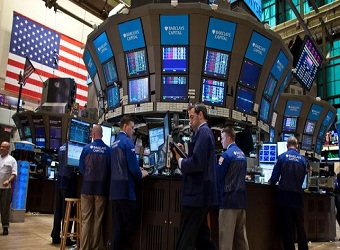U.S. stocks suddenly sold off in a matter of seconds on Monday after the country’s President Donald Trump said he would consider breaking up the big banks.
The Dow Jones industrial average traded 42.12 points lower after Trump made the remarks, before recovering back breakeven.
“Taking a shot at the big banks is not going boding well with some of those big Dow components,” said Art Hogan, chief market strategist at Wunderlich Securities. “Talking about breaking up the big banks is not necessarily conducive to deregulation. One of these things is not like the other.”
Both the SPDR S&P Bank ETF (KBE) and the Regional Banking ETF (KRE) fell sharply before bouncing back slightly.
The S&P 500 gained 0.15 percent, with financials and information technology leading advancers.
“I think we’re stuck between risk on and risk off,” said Mike Bailey, director of research at FBB Capital Partners. “Investors aren’t quite ready to go to the dark side of risk-off selling. They may not want to miss out on more potential earnings gains.”
The Nasdaq hit a record high earlier in the session and was last trading about 0.6 percent higher.
Investors also parsed through several economic data releases. The ISM manufacturing index slipped to 54.8 in April from 57.2 and came in below consensus. Also, construction spending in March from a record high.
The Commerce Department said consumer spending remained flat in March, while personal income rose less than expected.
Several key economic data will also be released this week, including monthly U.S. jobs report. The Federal Reserve’s policymaking committee is also slated to meet this week, but they are largely expected to hold rates steady.
Market expectations for a rate hike on Wednesday are just 4.8 percent, according to the CME Group’s FedWatch tool.
“It’s a busy week for macro news,” said Peter Cardillo, chief market economist at First Standard Financial. “This week boils down to our reaction to the Fed and economic data.”
Meanwhile, lawmakers reached a deal Sunday to keep the government funded for the next five months, aides to senior members of Congress told NBC News.
The full House and Senate must still approve the bipartisan pact, which would be the first major legislation to clear Congress since Trump became president on Jan. 20.
Prompt passage of the legislation is expected this week.
“It’s one less thing the market has to worry about,” said Mark Luschini, chief investment strategist at Janney Montgomery Scott. “Typically, we see some weakness in anticipation of a shutdown but what we’ve [also] seen with previous governments is that the market tends to bounce back quickly from them.”
“The set-up is for the market to keep performing well with solid corporate and market fundamentals,” he said.
Earnings season also continues this week, with Apple, Facebook, Tesla and BP all reporting.
This earnings season has been strong thus far, with more than 75 percent of companies beating profit estimates and about 70 percent topping sales forecasts as of Friday morning, according to data from The Earnings Scout.
John Butters, senior earnings analyst at FactSet, said in a Friday note that the number of companies topping profit and sales estimates in the first quarter was above the five-year average.
Source: Reuters & CNBC
